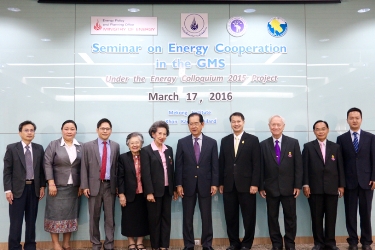Energy Cooperation in the GMS
March 18, 2016
Mekong Institute (MI) conducted a Seminar on Energy Cooperation in the GMS at Khon Kaen, Thailand on March 17, 2016. The seminar aimed to be a platform for participants to share success stories among the Greater Mekong Sub-region (GMS) countries and lessons learned on energy cooperation in the GMS and identify appropriate measures to tackle energy mismatch among the countries. The seminar is part of the energy colloquium 2015 project, supported by the Energy Policy Planning Office (EPPO), Ministry of Energy of Thailand. There were over 70 participants representing both the private and public sector from all over the GMS.
Welcome remarks were given by MI Executive Director, Dr. Watcharas Leelawath and the opening remarks were given by Dr. Twarath Sutabutr, Director General of the Energy Policy and Planning Office (EPPO), Ministry of Energy of Thailand. The keynote speaker of the event was none other than the former Minister of Energy and Minister of Commerce of Thailand and MI's Steering Committee Chairman, Dr. Narongchai Akrasanee.
Dr. Narongchai explained the importance of energy cooperation by breaking it down into four parts: GMS, GMS economic cooperation, energy, and energy cooperation. First, he gave a brief background of how the GMS came to be, before explaining that even various historic conflicts in the GMS due to political rivalries never stopped its member countries from trying to cooperate with one another.
As for the topic on energy, he emphasized that fuel and electric power are independent from one another but not mutually exclusive. Availability of energy in each country varies but none of them is self-sufficient. This led to his last topic, energy cooperation. The lack of self-sufficiency explains why energy cooperation is a top priority on the agenda in the GMS strategic framework. Energy must ensure availability, affordability, and acceptability.
Dr. Narongchai's remarks showed that sources of energy in the GMS are diversified and through cooperation each country can complement each other by considering energy cooperation to benefit all of GMS.
Later in the seminar, the focus was on opportunities, challenges, and recommendations for energy cooperation in the GMS. There were two representatives from the private sector and one from the public sector. The session was moderated by Dr. Watcharas Leelawath, who also shared and expounded on the role of MI as an organization that aims to facilitate energy cooperation with the help of various development partners.








